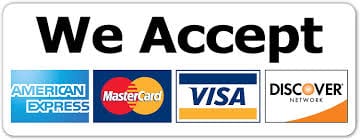What's the Cost of Credit Card Processors?
Having a credit card processor helps increase business by taking in extra forms of payment. Here an estimate of the fees you'll pay your credit card processing company:
Payment Depot: Starts at $40/month + $0.15 per transaction + interchange
Fattmerchant: Starts at $99.month. + interchange + 8-15¢ per transaction
PaymentCloud: $25/month gateway fee + transaction rate of 2.90% + $0.30
National Processing: $10/month + interchange + transaction cost of 0.15% + $0.07
Square: A processing fee of 2.6% + $0.10 contactless payments, swiped, inserted chips
Dharma Merchant Services: 0.20% and $0.10 per transaction above Interchange (including AVS!). Total fees per $100 sales – $0.72.
CDGcommerce: 2.75% + $0.30 per transaction for swiped or EMV (card-present) transactions.
Helcim: Average Credit Card Rate 1.92% + $0.08 + intercharge + 0.30%
With so many options, it can seem impossible to find a company that does not offer a way for their consumers to pay for a product or service by card. Compared to cash, 80% of customers prefer using cards to ensure a seamless transaction. When you have a business, most owners do not struggle about whether or not they should opt for a credit card processing service– they should.

The main thing businesses have concerns about is the credit card processor fees. How much are they, what factors affect these rates, and how can you understand it in a way to fit in your budget?
How Do Credit Card Processing Fees Work?
Credit card processor companies are only a part of the whole in regards to processing card transactions for customers. When you break it down, there are 3 parties involved in the entire process. There is:
- The card issuer
- The payment processor
- The card network
 You may be already familiar with a variety of card issuers that provide cards to consumers. A few examples include Citi, Chase, Capital One, and Bank of America. These financial institutions partner and work with networks like Mastercard and Visa who process credit or debit transactions.
You may be already familiar with a variety of card issuers that provide cards to consumers. A few examples include Citi, Chase, Capital One, and Bank of America. These financial institutions partner and work with networks like Mastercard and Visa who process credit or debit transactions.
Every time a customer uses these cards, the card issuer charges the merchant, often a percentage and a flat fee, to use the service. The payment processor works behind the senses to process every swipe safely and securely.
They too have partnerships with other brands and companies. Asides from the card issuer, the payments processor will also charge a fee for their service in a similar fashion.
Average Credit Card Processor Fees
If you are wondering how much it will cost you on average as a merchant to have the service, the answer is it depends. There are a few factors you have to know that go into total fees.
Overall, you can expect credit card processing fees to range between 1.5% to 3% for consumers that swipe cards and 3.5% for keyed-in purchases. The percentage you get will depend on which of the major networks you work with:
- Visa: 1.4% to 2.4%
- Mastercard: 1.5% to 2.6%
- Discover: 1.5% to 2.3%
- American Express: 2.5% to 3.5%
These fees are only associated with the credit card network you choose. Remember that there are 2 other parties (the card company and the payment processor) that will charge you for card processing. If you are looking for the average cost that compiles all three you may be looking at about 2.9% to 4.3% percent for every transaction.
Payments Processor Fee Rates
Payment processors will charge you per transaction in miscellaneous and monthly fees. The fees you must pay depend on which provider you pick. There are 4 factors that create the total cost:
- Blended pricing
- Tiered pricing
- Membership-based pricing
- Interchange-plus pricing
Blended pricing is flat fates for every transaction, whether the customers use a credit or debit card. you can divide tiered pricing even further in three ways: qualified, mid-qualified, and non-qualified transactions. Depending on which of the three a transaction falls into, the lower (qualified) or higher (non-qualified) you will pay.

Membership-based pricing is one many businesses may favor because there is no fee or deduction from the sales you make. You are only responsible to pay interchange rates each month or year.
There are two components with interchange-plus pricing. The “interchange” set by a card network and the “plus” which is the markup of the processor. Anytime you see “plus” it means you are also paying markup fees that can range from 2.1% and $0.10 for every transaction.
Payments Processor and Assessment Fees
Payments processor fees can range from 1.5% to 3.5% as well as another 15-30 center for keyed-in transactions.
Assessment fees are network fees that assess you twice a year. Overall you can expect your fees to like this:
- Visa: 0.13% for credit card transactions and 0.11% for debt transactions
- Mastercard: 0.12% for transactions under $1,000 and 0.13% for those over $1,000
- Discover: 0.13% for credit and debit transactions.
You can decide which is best for your business. Keep in mind every place may (or may not) also charge separate fees from things like chargebacks or wireless access fees.
Interchange Fee Rates Bank Institutes Charge
When companies process credit card transactions, there is another fee that can affect the total rate which is interchange fees. These fees change twice per year between the months of April and October. The fee covers issues such as risks of approving sales, handling, and fraud (should it occur).
The cost you pay will depend on how the transactions get processed, the card customers use, how much the item or service is, and the type of business you have based on your Merchant Category Code (MCC). MCCs are four-digit codes bank institutions design to classify transactions.
Airports, theme parks, restaurants, and shopping centers all have different charges. You must choose the correct MCC as card issuers do review data from payments to ensure you select the right code you should.
There are also fees you will have to pay if you decide to install an ATM machine at your business. Although ATM machines are an investment to have with the upfront fees you will pay, they are low maintenance and will not cost much to upkeep.
Knowing Credit Card Processor Fees To Make an Accurate Budget
Knowing and understanding what credit card processor fees are and how they work will allow you to create a more accurate budget for your business. You will also be able to choose which type of credit card processing companies you want to go for. The type of business you have asides from the company you pick will affect your pricing.
There are other services you will need to compare when you have a business that affects your budgets such as phone answering or online payroll services. Be sure to follow us on social media or come to our location if you want to find ways to save on expenses.

